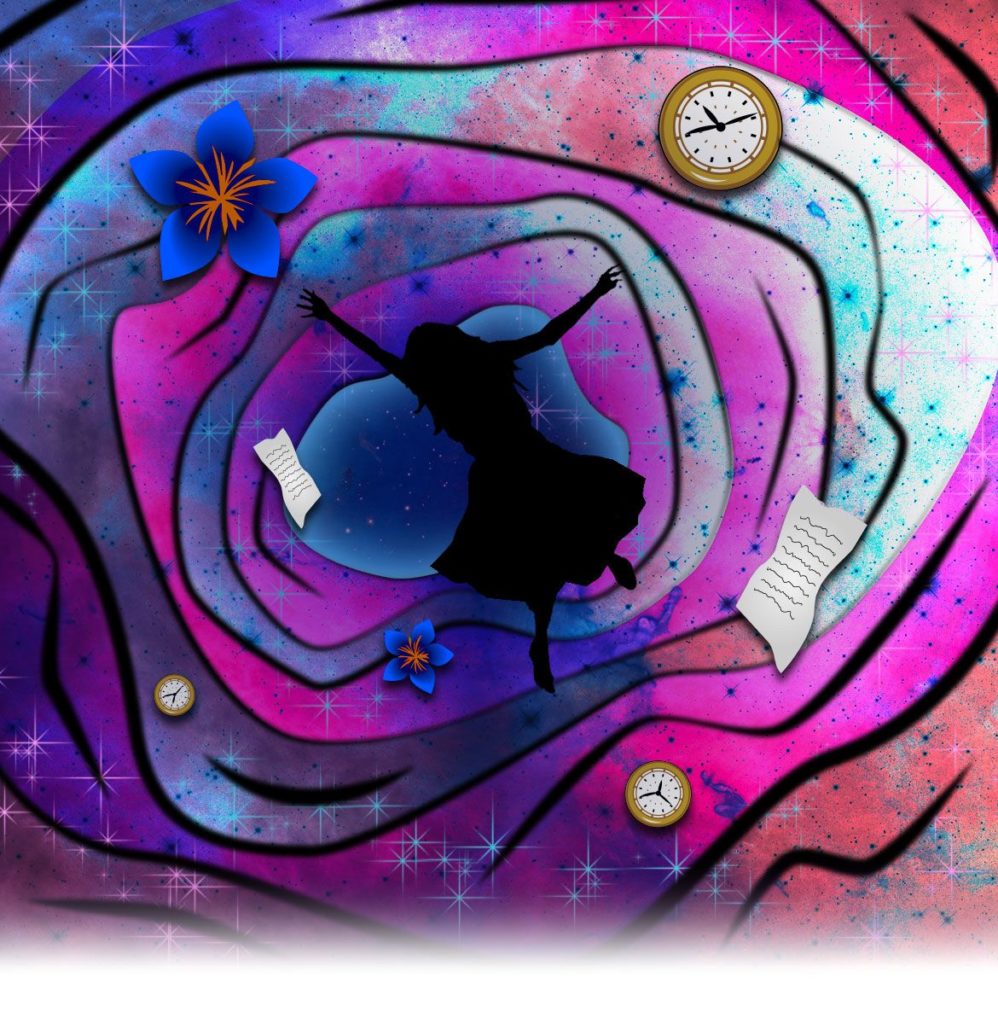
Is This Leningrad?
Richard M. Ankers
Head down the rabbit hole for a journey through time and space…
Artwork by Katie Barrett.
“Is this Leningrad?”
The man almost jumped out of his skin at the voice from nowhere. He looked all about, scratched his head, and said, “Where?” to no one in particular.
“Leningrad.”
The man, a tall fellow, hard-featured and dressed in a dark blue uniform, eyed the small girl who had just blinked into being whilst rubbing his eyes. She wore a black cardigan over a white blouse, a black skirt, white socks and black sandals, and reminded the uniformed man of newsprint, so striped was she. The girl also had the longest, blondest hair he’d ever seen. She couldn’t have been older than ten.
“The city?” continued the girl, undeterred.
“Are you trying to be funny?”
“No, sir, I’m lost.”
The uniformed man removed his cap, scratched his close-cropped hair, then seemed to get a hold of himself.
“Where is this ‘Leningrad’?”
“Russia.”
“What’s a ‘Russia’?”
“The country.”
“Well, this isn’t Russia, young lady. And you can’t be so lost as to not know what country you’re in, even if you have entered a place that was supposedly impregnable. Just you wait till I’ve had a word with those lads on the gate!”
The girl frowned and did a full three-sixty as if to check. All appeared as it should: daylight; sky; fresh air, but she definitely wasn’t in Leningrad. It was far too quiet. She turned back to the foot-tapping gentleman, gave him a hard stare, and continued.
“Might I enquire where I actually am?” She gave great emphasis to the actually as if her entire life depended upon it.
“Palientor.”
“Is that a country?”
The man shook his head. “A city.”
“What country is Palientor in?”
“Mendrola.”
“Where on Earth is that!” she exclaimed.
“Earth?”
“Yes, the planet. Are you sure you know where you are?” She wagged a finger at the man to show him she meant business.
“I know where I am, but do you?”
“I would think that obvious.” The girl stamped one small foot. “I have no idea. Might you enlighten me?”
“Why, Andromeda Prime, of course.”
“Don’t be silly, there is no such place.”
Already quite bored with the discussion, the man took one pace to the left to reveal a sign emblazoned in large, vermillion lettering: ‘WELCOME TO ANDROMEDA PRIME: Population Ten Trillion.’
He watched the young girl digest the words and then returned to his station.
“Now do you believe me?”
“I believe the words on that sign to be false.”
“What! Why?”
“Because there is no such place. I am very good with geography and this place does not exist. Therefore, it must be another place, most probably Paris because Paris contains foreign-sounding names.”
The girl folded her arms across her chest and set the man with a — you dare — look.
“Look, young lady, I don’t have time for theatrics. I can only presume one of the staff has put you up to this. And if they haven’t, then you’re trespassing, and I must set the law on you. So, if you don’t mind, I’d rather you just moved along.”
“I cannot move along, and you are the law.”
“Why can’t you?”
“Because, as I am trying to say, I do not know where I am.”
“I’ve just shown you.”
“You have revealed a sign and nothing more. What good are words if those words are meaningless?”
“What more can I do?”
“Tell the truth.”
The little girl stamped her foot even harder. She pouted with such ferocity it looked like her bottom lip might unhinge and clatter to the floor.
It may have been her watery, blue-eyed look, her small yet stubborn stature, or good old-fashioned pity, but the man softened his expression and tried again.
“Is there anywhere I might escort you, miss?”
The child gazed from the presumed platform she stood upon to the long water-filled lanes where train tracks should have lain. Endless strips of water in differing stages of turbulence stretched out before her like so many contained seas. Abutting these were metal stanchions that reached to the sky like God’s fingers. She craned her neck to take them in. Last but not least, her eyes locked on the roof of glass which almost kissed the clouds. Disappointed, she scratched her chin. Then, as if remembering something, she reached into her cardigan pocket, withdrew a small piece of paper, which she unfolded with care, and passed to the man in the dark blue uniform.
“Home,” she whispered. “Just home please, sir.”
This is what it said.
Dear Sir/Madame,
The child before you is my daughter, Francesca.
The man looked at the girl and said, “Pleased to meet you, Francesca.” He then continued reading.
My daughter is a temporal ghost. You may believe this untrue, but I can assure you it is not. Francesca travels during her sleep, most usually to twentieth century Russia some two hundred years earlier than where her body belongs. Nobody knows why this is the case, why she is so fixated on somewhere she has never been, but it is an indisputable fact. She is very strong willed and will believe nothing less than the truth no matter how harsh. In short, dear reader, she will almost certainly not believe you. Neither will she trust you. However, her father and I have instilled it in her psyche to search out authority figures — we pray them honest. They and they alone may guide a befuddled mind back to the arms of her loved ones via this incorporeally inserted note, our one hope of seeing our darling awaken.
The man looked to the girl who stood there perplexed.
There is but one way to return my daughter home to England, one sickening and necessary action capable of the required jolt: you must kill her. I ask you do so with compassion. This may seem a harsh responsibility, evil even, but it is the sole way to restore Francesca to those who cherish her.
I thank you for your help in this most disturbing of matters and hope upon hope you can read English.
Yours sincerely,
Imelda Montgomery
The man looked to the child, folded up the paper, and passed it back.
“It’s quiet for such a large station,” Francesca noted.
“This is the launch for Her Majesty Queen Mandarnia’s private off-world ship. I guard it although I’ve never met another soul here in twenty centons.”
“It reminds me of Leningrad.”
“I thought it might.”
“So? Will you help me?”
Francesca cast another look about the place, which avoided seeing the pain etched across the man’s lined face.
“Yes, Francesca, I’ll help you.”
“Yippee!” she squealed. “I knew I could trust a policeman.”
“I’m just Hestronious the nightwatchman.”
“But it isn’t night.”
“Why do you say that?”
“Because it is light.”
Hestronious strode toward a large plant with bulbous purple and blue flowers and whispered something into its stamen. The world turned to one of obsidian interspersed with galaxies of vermilion, emerald, and gold.
“Wow!” Francesca gasped.
“Her Majesty fears the dark, so almost everything is covered by these artificial day roofs.”
“It’s wonderful. I should very much like to stay in the day, as I hate the night.”
“I’m not surprised,” Hestronious said.
“Pardon?”
“Oh, nothing.”
“Why is there all this water?”
“Her Majesty takes these water lanes between the stars. Each waterway is a route to one of her kingdoms. Each lane flows from one world to the next.”
“I see,” said Francesca, steepling her fingers like an elderly professor. “Do you think one of these lanes might lead home? Would your queen give me a lift?”
“I’m sure she would, we’re on first name terms she and I. But…”
“But, what?”
“Would you recognise the colour of your own sea? It is the universal seas that Her Majesty’s ship sails upon. Each is as individual a route as that to our own front door. Each is a coloured chart to places removed in time and space.”
Francesca took a closer inspection of the waterways. The waters varied from turquoise to navy blue and back again, some heaving with violent waves, others like millponds.
“Our sea, the North Sea,” she said, very proud of herself for remembering, “is dark blue like your uniform.”
“Dark blue, you say. Hm,” Hestronious mused. “Follow me, Francesca. I believe I do know the way.”
Hestronious offered Francesca his hand, which she took; it froze his palm, and led her away across bridges and stepping-stones, gantries and grates. Soon they stood by an endless strip of calm, dark blue water.
“Does this look about right?”
“Almost,” replied Francesca without being one-hundred percent sure.
“Do you think you could put your head in the water to check?”
“But my hair will get wet.”
“We have to be sure. We don’t want you ending up in some Alpha-Centauri backwater.”
“Good point,” Francesca agreed in a very grown-up manner.
“I tell you what, I’ll gather your hair up in a ponytail and hold it out of the way,” said Hestronious
“Thank you. I shall be sure to tell my mother what a helpful policeman you’ve been. You might even get a promotion.” Francesca nodded as if it were all but guaranteed.
The little girl crept closer to the water’s edge, got down on her knees and peered at the reflective surface.
Hestronious gathered her long hair up in one hand and held it like he’d promised.
“Are you sure?” she said, as he knelt at her side.
“Yes, Francesca.”
“All right, but only because you’re a policeman.”
He hadn’t the stomach to correct her.
Francesca leaned out as far as she could, took a deep breath and thrust her face into the water.
Hestronious wept as the girl thrashed. He cried his heart out. When she stopped with one last flick of a sandalled foot like a fish beached by the turning tide, he wept some more.
Francesca vanished in a puff of violet smoke, his hand left clutching air.
*
Hestronious resigned his post the next day and was never the same. He took a position as a library guard, somewhere dark, somewhere the exact opposite of his old job. There he worked for many years amongst the musty tang of ancient manuscripts and silent halls, his hair growing greyer, his waist growing large. He hated it, but he hated everything now. He’d had enough of different worlds, strange places and the people therein.
*
One night whilst out making his rounds, Hestronious came to a sudden stop. He shone his torch at an image of a little girl in a black cardigan and white blouse. She had long, blonde hair and the most beautiful blue eyes. He couldn’t remember seeing the picture before. It was more a ghost than a wall hanging. But the library was large and full of sky-high passages littered with such adornments. The child held a note in her palm all folded and creased, the writing on it faint and barely decipherable. She appeared sad, yet determined by the set of her jaw. He thought it the oddest picture he’d ever seen, but it drew him like candy a child.
Hestronious was so engrossed, he hardly felt the tug at his elbow, or the voice that asked in a puzzled, gentle tone, “Is this Leningrad?”
Richard M. Ankers is the English author of The Eternals dark fantasy series. Richard lives to write.
